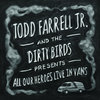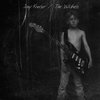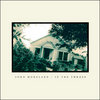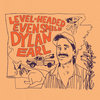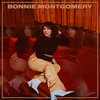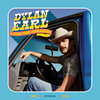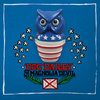American Stranger by The Only Sons
Tracklist
| 1. | Cutting Corners | 3:19 |
| 2. | Put Up A Fight | 2:34 |
| 3. | Warning You | 3:25 |
| 4. | Just My Luck | 3:38 |
| 5. | The Devil Does | 3:32 |
| 6. | Standing Water | 3:22 |
| 7. | Hurt Someone | 3:13 |
| 8. | Death Bed | 3:17 |
| 9. | Gone Down Swinging | 4:54 |
| 10. | Temptation | 3:25 |
| 11. | Written Word | 3:27 |
| 12. | More Like You | 3:25 |
Credits
released February 1, 2011
Words and Music: Kent Eugene Goolsby
Stocked Pond Publishing (BMI)
Engineered by Mikey Allred
Produced by Joey Kneiser
Mastered by John Baldwin
Recorded at Cumberland Presbyterian Church in Rockvale, TN
-------------------------------------------
The Only Sons: Forging a Musical Identity
American Stranger arrives at a pivotal moment in the lives of the band members, one that we all face at some point or another: that twenty-something crossroads when one is told, “it is time to decide what you will be; it is time to define yourself. Choose and move ahead accordingly.” Thankfully for those that hear American Stranger, The Only Sons’ choice of direction resoundingly clear. “We view this as a turn-the-corner record,” lead singer Kent Goolsby says of the new album. “[We want it to say] we’re going full time with this thing…we’re focused on this one.” Given the quality of the band’s first two albums (2008’s Young Lungs and 2009’s Steel Hearts), this should come as encouraging, albeit a bit surprising, news to their fans. Quite frankly if those earlier albums, specifically Steel Hearts, lacked focus you’d be hard-pressed to find the proof of it. Whatever the case was, it is clear from talking to Kent Goolsby that this band has decided music is no mere hobby but the business they have chosen, and come Hell or high water, they are committed to making it work. “There’s no race worth the win / If you’re gonna cut corners, my friend,” Goolsby sings on American Stranger’s opening track “Cutting Corners”—a fitting mantra to begin a career-defining album.
It should be noted before getting too far along that focusing on this band’s relative youth is by no means some sort of apology or acknowledgement of inadequacy; to the contrary, it makes American Stranger better in every way. Goolsby says that in large part, American Stranger is a record about entering the “real world” and “feeling…reality and the pressures of growing up. It’s about that struggle.” Thematically, that struggle for self-definition permeates every track of the record. Each grapples with the powerfully influential forces that so define our pasts and presents—family, religion, love—and considers how we apply them to our uncertain futures. It is a fight we all fight; probably it never stops. It is appropriate, then, that many of the songs on American Stranger pack such a figurative punch with track titles such as “Hurt Someone,” “Gone Down Swinging,” and “Put Up a Fight,” the latter of which exemplifies the band’s fighting spirit: “Been broken, been fixed / Been swung at, been hit / Been stranded, been found / Been banged up, been face down…But now I’m gonna put up a fight.”
Aside from a boundless sea of musical support and guidance from some of Murfreesboro’s musical elite, it is perhaps the church from which The Only Sons have gained the most, but not in the ways one might think. Ready to totally invest themselves in the band and eager to establish their own identity as such, the band felt it necessary to move away from Murfreesboro proper and into a bit of self-imposed isolation. But a focused environment free from unwanted influence was not easy to come by. Goolsby says, “we wanted to move away from what we knew, so we moved to the country, and that changed the record.” Call it a blessing, good luck, or what you will, but an opportunity to go rural came when the parsonage of the Rockvale Cumberland Presbyterian Church became too small to house the family of its pastor, bassist Jonathan Merritt’s mother. The church agreed to allow the band to move into the house, a windfall they repay in part by playing in the church’s band during Sunday morning contemporary services—“We enjoy it. Any time we can play music is [time well spent].” The church’s sanctuary also provided the space for the band to record American Stranger, which accounts for the album’s cavernous depth and tone. It may seem uncommon for a church to be so open and supportive of a group of secular young rockers, and if indeed such practice is not “the norm” amongst other congregations, it certainly speaks to the substance of this one.
Appropriate for the place of its recording and its influence on the band, American Stranger is heavy with religious allusion, and some of its best songs exude that influence. “[Religion] is impossible to ignore; we grew up in it. As a kid, it was what you did. It was about being with your friends. We all met at church camp,” Goolsby says of the church’s role in the band’s music, a role that is clear from a cursory glance at the track titles. For most Americans and especially those in the South, religion is something that surrounds us from birth and influences the identities we develop, and such is definitely the case for this album’s sense of self. In “Temptation,” Goolsby seems to channel Tom Petty’s “Refugee” to skillfully contemporize the Genesis story of temptation in the Garden of Eden: “You took a walk in the garden, and you ate the fruit / Yeah talkin’ snakes don’t much bother you.” To borrow another track title from American Stranger, the “Written Word” has impacted us all for better or worse, but in the case of this album, it only enhances its righteousness.
And so well supported, well loved, and well oiled, The Only Sons set out to back up who and what American Stranger says they are. With an inspiring drive to succeed in the ever-changing world of music, this band gives no indication that they will be anything other than a self-fulfilling prophecy—no “Cutting Corners” and all “Put Up a Fight.” Goolsby says that as a songwriter he has to always be open to songs wherever he goes and gives the example of driving through Smithville, TN and seeing a church marquis that said, “Do you worry about where your soul’s going? The Devil Does!” That sign, the likes of which we’ve all seen along so many Southern roads, gave the name to one of the songs on American Stranger, but moreover it touches on a human indifference to spiritual fate and future. If The Only Sons have a musical fate and future, you can bet it is in no one’s hands but theirs. If not, you can be sure they’ll wrench it out of the tightest grip and reclaim it as their own.
-NICK NICHOLS (2011)
This Is American Music
Full Text Article: www.ThisIsAmericanMusic.com/home/2011/1/19/the-only-sons-forging-a-musical-identity.html
Words and Music: Kent Eugene Goolsby
Stocked Pond Publishing (BMI)
Engineered by Mikey Allred
Produced by Joey Kneiser
Mastered by John Baldwin
Recorded at Cumberland Presbyterian Church in Rockvale, TN
-------------------------------------------
The Only Sons: Forging a Musical Identity
American Stranger arrives at a pivotal moment in the lives of the band members, one that we all face at some point or another: that twenty-something crossroads when one is told, “it is time to decide what you will be; it is time to define yourself. Choose and move ahead accordingly.” Thankfully for those that hear American Stranger, The Only Sons’ choice of direction resoundingly clear. “We view this as a turn-the-corner record,” lead singer Kent Goolsby says of the new album. “[We want it to say] we’re going full time with this thing…we’re focused on this one.” Given the quality of the band’s first two albums (2008’s Young Lungs and 2009’s Steel Hearts), this should come as encouraging, albeit a bit surprising, news to their fans. Quite frankly if those earlier albums, specifically Steel Hearts, lacked focus you’d be hard-pressed to find the proof of it. Whatever the case was, it is clear from talking to Kent Goolsby that this band has decided music is no mere hobby but the business they have chosen, and come Hell or high water, they are committed to making it work. “There’s no race worth the win / If you’re gonna cut corners, my friend,” Goolsby sings on American Stranger’s opening track “Cutting Corners”—a fitting mantra to begin a career-defining album.
It should be noted before getting too far along that focusing on this band’s relative youth is by no means some sort of apology or acknowledgement of inadequacy; to the contrary, it makes American Stranger better in every way. Goolsby says that in large part, American Stranger is a record about entering the “real world” and “feeling…reality and the pressures of growing up. It’s about that struggle.” Thematically, that struggle for self-definition permeates every track of the record. Each grapples with the powerfully influential forces that so define our pasts and presents—family, religion, love—and considers how we apply them to our uncertain futures. It is a fight we all fight; probably it never stops. It is appropriate, then, that many of the songs on American Stranger pack such a figurative punch with track titles such as “Hurt Someone,” “Gone Down Swinging,” and “Put Up a Fight,” the latter of which exemplifies the band’s fighting spirit: “Been broken, been fixed / Been swung at, been hit / Been stranded, been found / Been banged up, been face down…But now I’m gonna put up a fight.”
Aside from a boundless sea of musical support and guidance from some of Murfreesboro’s musical elite, it is perhaps the church from which The Only Sons have gained the most, but not in the ways one might think. Ready to totally invest themselves in the band and eager to establish their own identity as such, the band felt it necessary to move away from Murfreesboro proper and into a bit of self-imposed isolation. But a focused environment free from unwanted influence was not easy to come by. Goolsby says, “we wanted to move away from what we knew, so we moved to the country, and that changed the record.” Call it a blessing, good luck, or what you will, but an opportunity to go rural came when the parsonage of the Rockvale Cumberland Presbyterian Church became too small to house the family of its pastor, bassist Jonathan Merritt’s mother. The church agreed to allow the band to move into the house, a windfall they repay in part by playing in the church’s band during Sunday morning contemporary services—“We enjoy it. Any time we can play music is [time well spent].” The church’s sanctuary also provided the space for the band to record American Stranger, which accounts for the album’s cavernous depth and tone. It may seem uncommon for a church to be so open and supportive of a group of secular young rockers, and if indeed such practice is not “the norm” amongst other congregations, it certainly speaks to the substance of this one.
Appropriate for the place of its recording and its influence on the band, American Stranger is heavy with religious allusion, and some of its best songs exude that influence. “[Religion] is impossible to ignore; we grew up in it. As a kid, it was what you did. It was about being with your friends. We all met at church camp,” Goolsby says of the church’s role in the band’s music, a role that is clear from a cursory glance at the track titles. For most Americans and especially those in the South, religion is something that surrounds us from birth and influences the identities we develop, and such is definitely the case for this album’s sense of self. In “Temptation,” Goolsby seems to channel Tom Petty’s “Refugee” to skillfully contemporize the Genesis story of temptation in the Garden of Eden: “You took a walk in the garden, and you ate the fruit / Yeah talkin’ snakes don’t much bother you.” To borrow another track title from American Stranger, the “Written Word” has impacted us all for better or worse, but in the case of this album, it only enhances its righteousness.
And so well supported, well loved, and well oiled, The Only Sons set out to back up who and what American Stranger says they are. With an inspiring drive to succeed in the ever-changing world of music, this band gives no indication that they will be anything other than a self-fulfilling prophecy—no “Cutting Corners” and all “Put Up a Fight.” Goolsby says that as a songwriter he has to always be open to songs wherever he goes and gives the example of driving through Smithville, TN and seeing a church marquis that said, “Do you worry about where your soul’s going? The Devil Does!” That sign, the likes of which we’ve all seen along so many Southern roads, gave the name to one of the songs on American Stranger, but moreover it touches on a human indifference to spiritual fate and future. If The Only Sons have a musical fate and future, you can bet it is in no one’s hands but theirs. If not, you can be sure they’ll wrench it out of the tightest grip and reclaim it as their own.
-NICK NICHOLS (2011)
This Is American Music
Full Text Article: www.ThisIsAmericanMusic.com/home/2011/1/19/the-only-sons-forging-a-musical-identity.html

